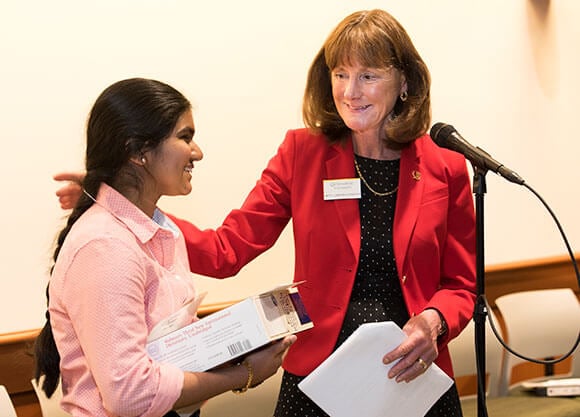
Reflecting on how 9/11 changed education and a generation
September 08, 2021

September 08, 2021

Like everyone else, I remember the dazzling sun and bright blue skies before the first plane struck the World Trade Center. It was the start of Period 2 and another teacher was scheduled to use my room for his history class. As his students filed in, he called me outside, and asked if I had heard the news. What he shared with me was so shocking.
At first, I thought he couldn’t possibly have accurate information, so he sent me to the AV room where a television was set up. Sorrow and shock hit. I thought that it must be an accident; and then, the second plane hit and I knew. How could this be happening in the United States? I had always felt so safe and so very lucky to be a citizen in this country where nothing like this had ever happened.
Watching the horrific scenes as people leaped from the burning building, knowing they had no choice but to jump or burn to death, will be seared into my mind forever. As tears welled, I headed to the principal’s office. She was stoic, and I remember thinking, “How can she not be touched by this horrible tragedy?” I am sure she was, but was setting an example for us who had to go back to the classroom and carry on as if nothing happened.
The administration decided that we were not to share what we knew with the students. We weren’t far from the New York border and the thinking was that students might have relatives who worked in the World Trade Center towers. In addition, the parents would know how to share this horrific event with their individual children better than we could as a whole.
Trying to teach after Period 2 was incredibly hard. I wanted to talk to my own two children and my husband, but cell phones were still not super popular in 2001, and we weren’t allowed to have them in the classroom. Very few students had access to phones. At lunchtime, with the students out of the room, I listed to the radio, and heard about the Pentagon and the plane that was crashed in Pennsylvania. I paced in my room to release some of the anxiety that built inside of me. Teaching my last three classes was almost impossible, and I left school immediately after the last child left the building.
My husband called to tell me they were on call to receive any casualties from the disaster. Every TV in Neuro ICU where he worked was tuned to CNN and all patients who could be sent home were discharged to make way for World Trade Center emergency patients. But there were no patients. Most died in the carnage.
My oldest son was in a panic. His best friend worked in the World Trade Center and he could not reach him. Miraculously, his friend has forgotten his brief case and had gone back home to retrieve it. When he returned, the buildings were coming down.
My parents were stuck in Russia when all flights flying into the U.S. were grounded. I remember being so afraid for them. My mom had broken her ankle sightseeing and was on crutches. Finally, they were able to get a flight to Dublin, and they stayed with my sister and her family until flights resumed a week or so later.
School was very somber the next day and all of the children and teachers were visibly shaken. Some had lost relatives or friends of their parents; those kids and staff weren’t in school the next day. No one could teach and no one could learn. We sat in circles on the floor and just talked. I remember having a fear I had never had before. Were we safe in our portable classroom in Southbury? I could only imagine how my 12 year olds were feeling inside.
A month later, my husband and I visited Ground Zero and witnessed the black shrouded windows of nearby businesses, the barricades surrounding the area and the workers trying to find pieces of the lives lost to share with grieving families. We walked by the chapel where firefighters were nurtured and fed and where they prayed. That same sadness enveloped me when we visited the National September 11 Memorial and Museum years later.
This is one of those tragedies that is scorched into our brains for a lifetime. My freshman QU students in ED 140, Introduction to Public Education, were not even born in 2001. When they learn about this horrific event in our history, they can only imagine what citizens of the U.S. witnessed that gorgeous Tuesday in September. They can never truly feel the poignant sadness that emerges after such a senseless loss of life, and the loss of life as we knew it.
Quinnipiac Today is your source for what's happening throughout #BobcatNation. Sign up for our weekly email newsletter to be among the first to know about news, events and members of our Bobcat family who are making a positive difference in our world.
Sign Up Now